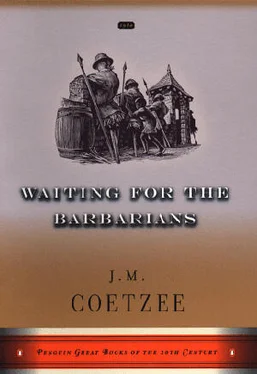But more often in the very act of caressing her I am overcome with sleep as if poleaxed, fall into oblivion sprawled upon her body, and wake an hour or two later dizzy, confused, thirsty. These dreamless spells are like death to me, or enchantment, blank, outside time.
One evening, rubbing her scalp with oil, massaging her temples and forehead, I notice in the corner of one eye a greyish puckering as though a caterpillar lay there with its head under her eyelid, grazing.
"What is this?" I ask, tracing the caterpillar with my fingernail.
"That is where they touched me," she says, and pushes my hand away
"Does it hurt?"
She shakes her head.
"Let me look."
It has been growing more and more clear to me that until the marks on this girl's body are deciphered and understood I cannot let go of her. Between thumb and forefinger I part her eyelids. The caterpillar comes to an end, decapitated, at the pink inner rim of the eyelid. There is no other mark. The eye is whole.
I look into the eye. Am I to believe that gazing back at me she sees nothing-my feet perhaps, parts of the room, a hazy circle of light, but at the centre, where I am, only a blur, a blank? I pass my hand slowly in front of her face, watching her pupils. I cannot discern any movement. She does not blink. But she smiles: "Why do you do that? Do you think I cannot see?" Brown eyes, so brown as to be black.
I touch my lips to her forehead. "What did they do to you?" I murmur. My tongue is slow, I sway on my feet with exhaustion. "Why don't you want to tell me?"
She shakes her head. On the edge of oblivion it comes back to me that my fingers, running over her buttocks, have felt a phantom crisscross of ridges under the skin. "Nothing is worse than what we can imagine," I mumble. She gives no sign that she has even heard me. I slump on the couch, drawing her down beside me, yawning. "Tell me," I want to say, "don't make a mystery of it, pain is only pain"; but words elude me. My arm folds around her, my lips are at the hollow of her ear, I struggle to speak; then blackness falls.
* *
I have relieved her of the shame of begging and installed her in the barracks kitchen as a scullery-maid. "From the kitchen to the Magistrate's bed in sixteen easy steps"-that is how the soldiers talk of the kitchenmaids. Another of their sayings: "What is the last thing the Magistrate does when he leaves in the morning?-He shuts his latest girl in the oven." The smaller a town the more richly it hums with gossip. There are no private affairs here. Gossip is the air we breathe. For part of the day she washes dishes, peels vegetables, helps to bake bread and prepare the humdrum round of porridge, soup and stew that the soldiers are fed. There are, besides her, the old lady who has ruled over the kitchen almost as long as I have been magistrate, and two girls, the younger of whom ascended the sixteen stairs once or twice last year. At first I am afraid these two will band together against her; but no, they seem quickly to make friends. Passing the kitchen door on my way out I hear, muffled by the steamy warmth, voices, soft chatter, giggles. I am amused to detect in myself the faintest stab of jealousy.
"Do you mind the work?" I ask her.
"I like the other girls. They are nice."
"At least it's better than begging, isn't it?"
"Yes."
The three girls sleep together in a small room a few doors from the kitchen, if they do not happen to be sleeping elsewhere. It is to this room that she finds her way in the dark if I send her away in the night or the early morning. No doubt her friends have prattled about these trysts of hers, and the details are all over the marketplace. The older a man the more grotesque people find his couplings, like the spasms of a dying animal. I cannot play the part of a man of iron or a saintly widower. Sniggers, jokes, knowing looks-these are part of the price I am resigned to paying.
"Do you like it, living in a town?" I ask her cautiously.
"I like it most of the time. There is more to do."
"Are there things you miss?"
"I miss my sister."
"If you really want to go back," I say, "I will have you taken."
"Taken where?" she says. She lies on her back with her hands placidly over her breasts. I lie beside her, speaking softly. This is where the break always falls. This is where my hand, caressing her belly, seems as awkward as a lobster. The erotic impulse, if that is what it has been, withers; with surprise I see myself clutched to this stolid girl, unable to remember what I ever desired in her, angry with myself for wanting and not wanting her.
She herself is oblivious of my swings of mood. Her days have begun to settle into a routine with which she seems content. In the morning after I have left she comes to sweep and dust the apartment.
Then she helps in the kitchen with the midday meal. Her afternoons are mainly her own. After the evening meal, after all the pots and pans have been scoured, the floor washed, the fire damped, she leaves her fellows and picks her way up the stairs to me. She undresses and lies down, waiting for my inexplicable attentions. Perhaps I sit beside her stroking her body, waiting for a flush of blood that never truly comes. Perhaps I simply blow out the lamp and settle down with her. In the dark she soon forgets me and falls asleep. So I lie beside this healthy young body while it knits itself in sleep into ever sturdier health, working in silence even at the points of irremediable damage, the eyes, the feet, to be whole again.
I cast my mind back, trying to recover an image of her as she was before. I must believe that I saw her on the day she was brought in by the soldiers roped neck to neck with the other barbarian prisoners. I know that my gaze must have passed over her when, together with the others, she sat in the barracks yard waiting for whatever was to happen next. My eye passed over her; but I have no memory of that passage. On that day she was still unmarked; but I must believe she was unmarked as I must believe she was once a child, a little girl in pigtails running after her pet lamb in a universe where somewhere far away I strode in the pride of my life. Strain as I will, my first image remains of the kneeling beggar-girl.
I have not entered her. From the beginning my desire has not taken on that direction, that directedness. Lodging my dry old man's member in that blood-hot sheath makes me think of acid in milk, ashes in honey, chalk in bread. When I look at her naked body and my own, I find it impossible to believe that once upon a time I imagined the human form as a flower radiating out from a kernel in the loins. These bodies of hers and mine are diffuse, gaseous, centreless, at one moment spinning about a vortex here, at another curdling, thickening elsewhere; but often also flat, blank. I know what to do with her no more than one cloud in the sky knows what to do with another.
I watch her as she undresses, hoping to capture in her movements a hint of an old free state. But even the motion with which she pulls the smock up over her head and throws it aside is crabbed, defensive, trammelled, as though she were afraid of striking unseen obstacles. Her face has the look of something that knows itself watched.
From a trapper I have bought a little silver-fox cub. It is no more than a few months old, barely weaned, with teeth like a fine saw-edge. The first day she took it with her to the kitchen, but it was terrified by the fire and the noise, so now I keep it upstairs, where it cowers all day under the furniture. During the night I sometimes hear the click-click of its claws on the wooden floors as it roams about. It laps from a saucer of milk and eats scraps of cooked meat. It cannot be housetrained; the rooms have begun to smell of its droppings; but it is still too early to let it run loose in the yard. Every few days I call in the cook's grandson to crawl behind the cabinet and under the chairs to clean up the mess.
Читать дальше












